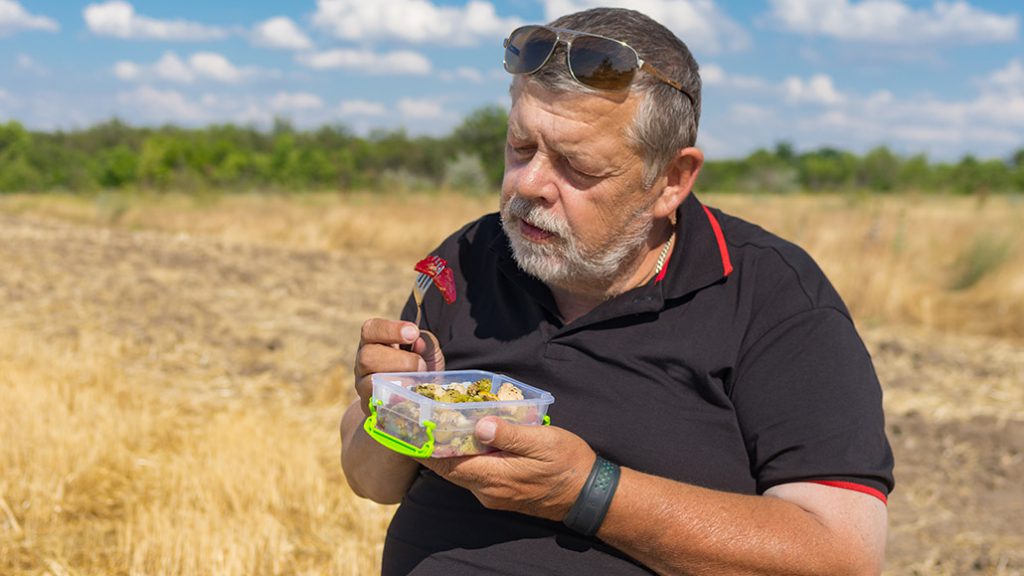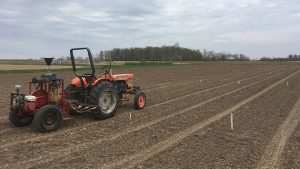Preparing for stress
STAYING WELL DURING HARVEST

HARVEST EQUIPMENT IS field-ready, software is up to date, and clean bins are ready for grain. The busiest season on the farm is quickly approaching — but do you have a plan to manage stress?
| WHAT YOU NEED TO KNOW • Stress responses can be physical, emotional, or cognitive. • Effective energy management includes eating every three to four hours. • Being awake 18 hours or more causes the same impairment as having a blood alcohol content (BAC) of 0.5%. • Check in with your farm team/family daily to see how everyone is coping with stress management and identify anything that is needed to look after your, and their, mental wellbeing. |
Kathy Somers, registered kinesiologist and sole proprietor behind the Stress Management and High Performance Clinic in Guelph, says farmers should be preparing now to manage potential health changes during harvest.
“Stress is the way we respond to the demands or pressures upon us,” she says. “Harvest time is challenging because the demands and pressures are greatly increasing so you know stress will increase and you might experience symptoms that are uncomfortable.”
STRESS SYMPTOMS
Stress is felt when demands and pressures exceed personal and environmental strengths and resources. “Stress responses can be physical, emotional, or cognitive but symptoms can be very individual,” says Somers.
“There are all kinds of stress responses,” she explains. “For some people it is very much their body talking to them through headaches, neck, back or shoulder tightness, gastrointestinal disturbances, or increased blood pressure.”
Changes in sleep, mood, and behaviour are also common symptoms of stress. “Some people have a shorter fuse or feel like they want to isolate or feel less hope,” she says. “Others might change their behaviour by smoking or drinking more, tapping fingers, twirling hair, or displaying other physical signs.”
PROACTIVE APPROACH
Somers encourages farmers to think about time management when planning for the harvest season. “I especially mean how you’re going to continue looking after yourself in terms of protecting sleep and eating food regularly,” she says.
According to the Centres for Disease Control and Prevention (CDC), lack of sleep makes you less alert and affects judgement, coordination, and reaction time behind the wheel. Being awake 18 hours or more causes the same impairment as having a blood alcohol content (BAC) of 0.5%. Being awake for 24 hours is equal to having a BAC of 0.10%.
“The more sleep time you cut, the more problematic it is,” says Somers. “If you are prone to mental health issues or cardiovascular problems, many symptoms display themselves without sleep, so you might find it difficult to do any of the harvest if you don’t protect your health.”
Somers says eating regular meals is another aspect of good stress management.
“Our bodies expect fuel in the form of food every two to four hours,” she explains. “If we go more than four hours without food, our bodies start releasing chemicals to mobilize fat stores or burn muscle but these are actually the harshest of the stress chemicals.”
Effective energy management includes eating every three to four hours.
“Each meal or snack should give us energy fast and energy to last by including protein and carbohydrate,” says Somers. “Protein gives us energy to last another three to four hours while carbohydrate helps us immediately.”
Somers advises using this meal plan instead of relying on caffeine or sugar for energy. “Coffee mimics adrenaline so it’s like drinking stress in a cup,” she says. “Caffeine and sugar are false friends that actually deplete energy so only have them if you love the taste and only after quality protein and carbohydrate.”
Farmers can plan ahead to implement these strategies during harvest by scheduling shifts to protect sleep time and coordinating extra help. Planning grocery lists for future meals and snacks and identifying food containers is also beneficial.
“When I was growing up on a family farm, we did a lot of baking and meal preparation in the summer so there was limited cooking to be done in the fall,” says Somers. “It’s important to think about foods that can quickly be picked up, stored in the shop, or packed to go in equipment.”
CONTINGENCY PLANNING
Somers recommends hosting a pre-harvest planning meeting as a team to brainstorm potential roadblocks and identify back-up plans.
“In a perfect world you can plan to start harvest on a specific day and work at certain times but weather, equipment breakdowns, and illness can happen so it is helpful to think of Plan B,” she says.
“Sometimes you also want to have a back-up plan to Plan B so think about what Plan C and Plan D would be even though you hope to never activate them.”
Contingency plans should include a course of action when illness occurs or stress increases. “As hard as it is to plan that you will take a morning off or take an hour away from harvest to talk to a doctor, counsellor, pastor, or friend, it may be more than worth the time. It is easier to do when it is thought about ahead of time,” says Somers.
“Research indicates that people who have a plan tend to manage anxiety and pain better in stressful situations, especially when it is written down.”
PSYCHOLOGICAL PREPARATION
According to Somers, harvest planning should also include a psychological aspect. “When are you going to talk as a family and as a farm team about how it is going?,” she asks. “This does not just mean how the harvest is coming but how you are doing as people.”
She cites daily meetings in hospital emergency rooms as an example of healthy stress management.
“The staff plan to meet for five minutes each morning to touch base and ask how everyone is doing. They identify anything they need to do to look after themselves to make sure they’re as strong as possible as individuals and as a team during their shift.”
“I recommend farmers do something similar during harvest with their family and farm team,” she says. “Plan Friday night suppers as a family and after eating, debrief the week and how you have been doing. As a farm team, perhaps it is a quick meeting by phone each day to review the plan and how you’re doing as people.”
BUILDING RESILIENCY
“We know from research that half of Canadian farmers are experiencing high stress,” says Somers, citing studies by Dr. Andria Jones-Bitton, University of Guelph. “These symptoms can certainly lead to greater depression and changes in health. It’s important to look after our bodies physically so we are more resistant to stress.”
“It is smart to be proactive. Knowing ahead of time when you’re sleeping, eating, and talking will keep you as strong as possible even though fatigue and stress can increase as the days of harvest go by.”
MENTAL HEALTH SUPPORT
If you are struggling with stress, depression, anxiety, or any mental health issue, help is available.
For help finding mental health services:
ConnexOntario 1-866-531-2600 www.connexontario.ca/
For suicide prevention and support:
Crisis Services Canada 1-833-456-4566 www.crisisservicescanada.ca/en/
Go to www.gfo.ca/farmerwellness for additional support resources including a directory of psychologists and social workers that are practicing in Ontario and have a farming background or experience in the industry.
Look for strategies for dealing with immediate stress in the October issue of Ontario Grain Farmer. •











